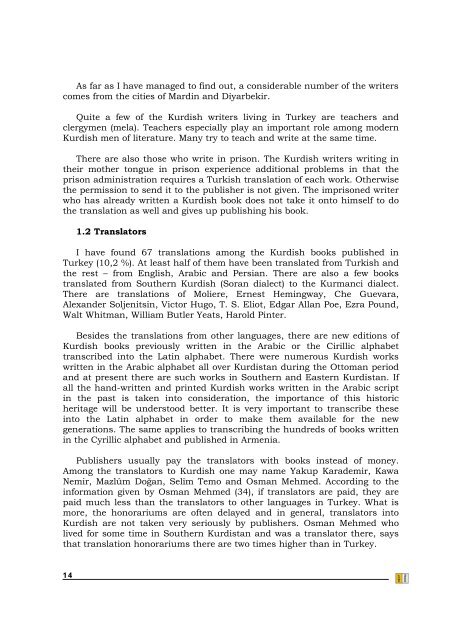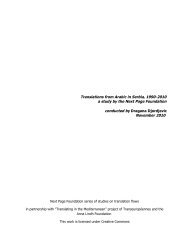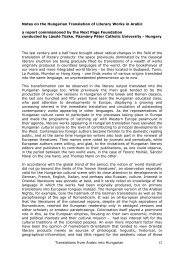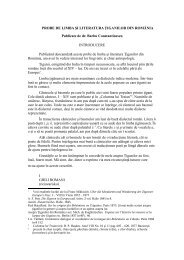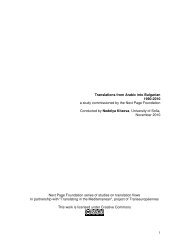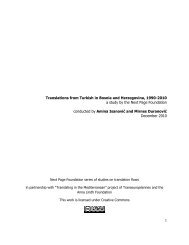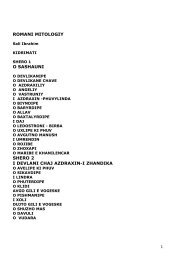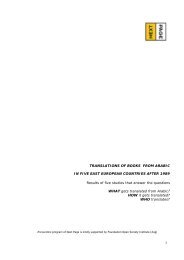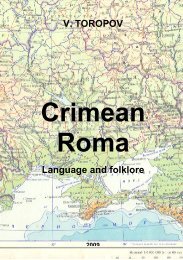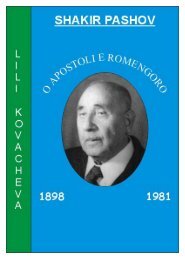the past and the present of book publishing in kurdish language in ...
the past and the present of book publishing in kurdish language in ...
the past and the present of book publishing in kurdish language in ...
Create successful ePaper yourself
Turn your PDF publications into a flip-book with our unique Google optimized e-Paper software.
As far as I have managed to f<strong>in</strong>d out, a considerable number <strong>of</strong> <strong>the</strong> writerscomes from <strong>the</strong> cities <strong>of</strong> Mard<strong>in</strong> <strong>and</strong> Diyarbekir.Quite a few <strong>of</strong> <strong>the</strong> Kurdish writers liv<strong>in</strong>g <strong>in</strong> Turkey are teachers <strong>and</strong>clergymen (mela). Teachers especially play an important role among modernKurdish men <strong>of</strong> literature. Many try to teach <strong>and</strong> write at <strong>the</strong> same time.There are also those who write <strong>in</strong> prison. The Kurdish writers writ<strong>in</strong>g <strong>in</strong><strong>the</strong>ir mo<strong>the</strong>r tongue <strong>in</strong> prison experience additional problems <strong>in</strong> that <strong>the</strong>prison adm<strong>in</strong>istration requires a Turkish translation <strong>of</strong> each work. O<strong>the</strong>rwise<strong>the</strong> permission to send it to <strong>the</strong> publisher is not given. The imprisoned writerwho has already written a Kurdish <strong>book</strong> does not take it onto himself to do<strong>the</strong> translation as well <strong>and</strong> gives up <strong>publish<strong>in</strong>g</strong> his <strong>book</strong>.1.2 TranslatorsI have found 67 translations among <strong>the</strong> Kurdish <strong>book</strong>s published <strong>in</strong>Turkey (10,2 %). At least half <strong>of</strong> <strong>the</strong>m have been translated from Turkish <strong>and</strong><strong>the</strong> rest – from English, Arabic <strong>and</strong> Persian. There are also a few <strong>book</strong>stranslated from Sou<strong>the</strong>rn Kurdish (Soran dialect) to <strong>the</strong> Kurmanci dialect.There are translations <strong>of</strong> Moliere, Ernest Hem<strong>in</strong>gway, Che Guevara,Alex<strong>and</strong>er Soljenits<strong>in</strong>, Victor Hugo, Т. S. Eliot, Edgar Allan Poe, Ezra Pound,Walt Whitman, William Butler Yeats, Harold P<strong>in</strong>ter.Besides <strong>the</strong> translations from o<strong>the</strong>r <strong>language</strong>s, <strong>the</strong>re are new editions <strong>of</strong>Kurdish <strong>book</strong>s previously written <strong>in</strong> <strong>the</strong> Arabic or <strong>the</strong> Cirillic alphabettranscribed <strong>in</strong>to <strong>the</strong> Lat<strong>in</strong> alphabet. There were numerous Kurdish workswritten <strong>in</strong> <strong>the</strong> Arabic alphabet all over Kurdistan dur<strong>in</strong>g <strong>the</strong> Ottoman period<strong>and</strong> at <strong>present</strong> <strong>the</strong>re are such works <strong>in</strong> Sou<strong>the</strong>rn <strong>and</strong> Eastern Kurdistan. Ifall <strong>the</strong> h<strong>and</strong>-written <strong>and</strong> pr<strong>in</strong>ted Kurdish works written <strong>in</strong> <strong>the</strong> Arabic script<strong>in</strong> <strong>the</strong> <strong>past</strong> is taken <strong>in</strong>to consideration, <strong>the</strong> importance <strong>of</strong> this historicheritage will be understood better. It is very important to transcribe <strong>the</strong>se<strong>in</strong>to <strong>the</strong> Lat<strong>in</strong> alphabet <strong>in</strong> order to make <strong>the</strong>m available for <strong>the</strong> newgenerations. The same applies to transcrib<strong>in</strong>g <strong>the</strong> hundreds <strong>of</strong> <strong>book</strong>s written<strong>in</strong> <strong>the</strong> Cyrillic alphabet <strong>and</strong> published <strong>in</strong> Armenia.Publishers usually pay <strong>the</strong> translators with <strong>book</strong>s <strong>in</strong>stead <strong>of</strong> money.Among <strong>the</strong> translators to Kurdish one may name Yakup Karademir, KawaNemir, Mazlûm Doğan, Selîm Temo <strong>and</strong> Osman Mehmed. Accord<strong>in</strong>g to <strong>the</strong><strong>in</strong>formation given by Osman Mehmed (34), if translators are paid, <strong>the</strong>y arepaid much less than <strong>the</strong> translators to o<strong>the</strong>r <strong>language</strong>s <strong>in</strong> Turkey. What ismore, <strong>the</strong> honorariums are <strong>of</strong>ten delayed <strong>and</strong> <strong>in</strong> general, translators <strong>in</strong>toKurdish are not taken very seriously by publishers. Osman Mehmed wholived for some time <strong>in</strong> Sou<strong>the</strong>rn Kurdistan <strong>and</strong> was a translator <strong>the</strong>re, saysthat translation honorariums <strong>the</strong>re are two times higher than <strong>in</strong> Turkey.14


